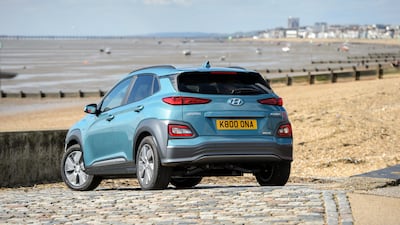Hyundai Motor Group confirmed on Friday the company will spend $5.5 billion on a huge electric vehicle plant near Savannah that will employ thousands — a deal Georgia’s governor called the largest economic development project in the state’s history.
Hyundai Motor Group chief executive Chang Jae-hoon made the announcement alongside Governor Brian Kemp at the site of the future factory in Bryan County, where state and local officials purchased a flat, sprawling tract for $61 million last year in hopes of luring a major manufacturer.
“Hard-working Georgians are going to have the opportunity to have a really high-paying, advanced manufacturing job with a great company,” Mr Kemp said in an interview.
Hyundai said it will employ at least 8,100 workers at the plant near the unincorporated town of Ellabell, where it will assemble electric vehicles as well as vehicle batteries. The company and state officials said they expect suppliers to invest an additional $1bn.
“It’s going to continue to bring wealth and opportunity to the region,” said Mr Kemp, who predicted a ripple effect that will boost businesses from Savannah’s already booming seaport to restaurants and convenience stores.
The announcement came as President Joe Biden visited South Korea. He was scheduled to meet Hyundai’s chief executive in Seoul on Sunday.
Jake Sullivan, the president’s national security adviser, told reporters Mr Biden “will have the opportunity to say thank you for this significant investment that will occur in the United States”.
The timing was fortunate for Mr Kemp, who is being challenged by former US senator David Perdue in a Republican primary election that will be decided on Tuesday.
This is the second large electric vehicle plant announced in Georgia in less than a year. Rivian Automotive announced in December plans for a $5bn electric vehicle plant east of Atlanta that is expected to employ about 7,500 workers.
Mr Kemp declined to discuss details of what incentives and tax breaks the company was offered for locating in Georgia. Rivian received and package worth $1.5bn.
Hyundai said it plans to move quickly with construction and hopes to begin producing vehicles in 2025.
The company will build the plant on 890 hectares that the state and partner local governments bought a year ago about 40 kilometres inland from Savannah. Bryan County and neighbouring Chatham County, which includes Savannah, each chipped in $9m towards the $61m purchase price.
Mr Kemp predicted the Hyundai plant will become one of the biggest customers for Savannah’s port, which has already recorded explosive growth in recent years.
Hyundai Motor Group sells cars under the Hyundai and Kia brands. The South Korean car maker already operates two assembly plants in Montgomery, Alabama, and in West Point, Georgia.
Mr Perdue planned a campaign stop in Savannah on Friday afternoon with Sarah Palin, a former Alaska governor and Republican vice presidential candidate. Mr Perdue has accused Mr Kemp to trying to buy his re-election with the Rivian deal and its big incentives.
Mr Kemp brushed off the criticism, noting Mr Perdue’s record of outsourcing US jobs to overseas manufactures as a corporate executive.
The governor said incentives help Georgia compete for big projects with states such as South Carolina, Tennessee and Texas. He pointed to the Kia plant in West Point as one that filled a void when the local textile industry shut down years earlier.
“You’ve seen downtowns that used to be ghost towns — they’re vibrant communities now,” Mr Kemp said.
He added: “These are investments that we’ll be reaping the benefits of 20 to 30 years down the road.”





























